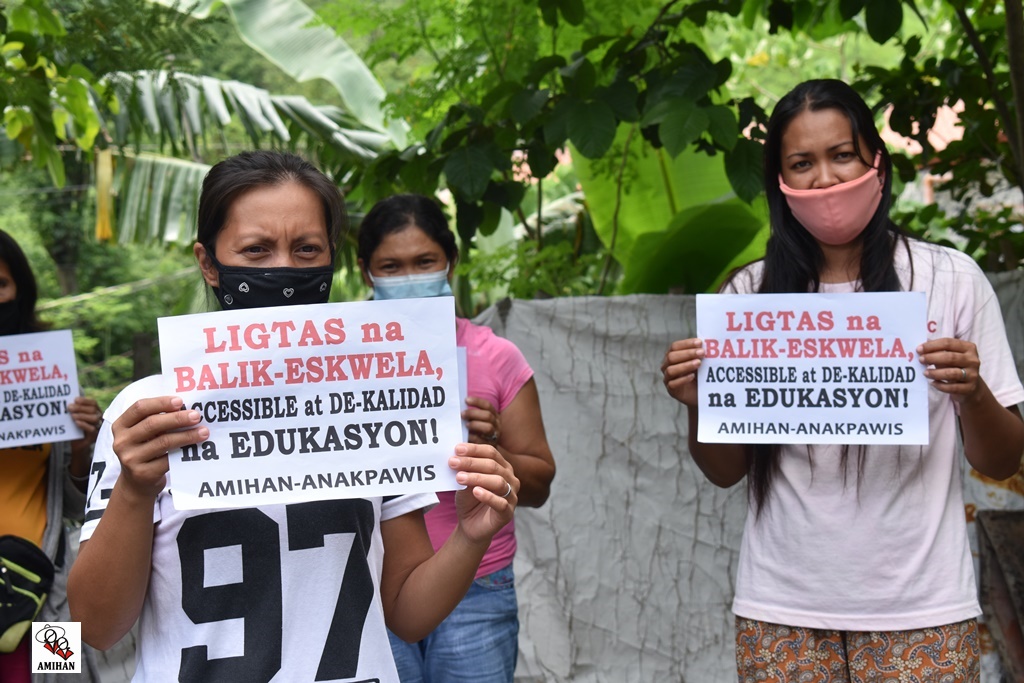Manila, Philippines – The National Federation of Peasant Women or AMIHAN raised the alarm on the preparedness of the peasant familes for the Distance Learning proposed by the Department of Education as an alternative to face-to-face classes this coming October 5, 2020. Amihan with Rural Women Advocates, National Network of Agrarian Reform Advocates, Pamalakaya and Anakpawis Partylist to hold an online forum dubbed as “Balik-Eskwela, Handa na ba ang mga anak ng magsasaka?’ today to express the sentiments of farmer and fisherfolk families from Bacoor City, Cavite and Rodriguez town, Rizal.
“Up to now, the incompetent measures of the Duterte regime in resolving the pandemic crisis haunt the peasant and rural-based sectors. Peasant families suffered from the impact of the lockdown due to loss of livelihood, bankruptcy, penniless, and distraught. These past weeks, we gathered community-based data on the preparedness and the possible impact of distance learning on the peasant families and children in Bacoor City, Cavite and Rodriguez town, Rizal, the distance learning was discriminatory and incompatible and will put peasant youth-students into disadvantaged positions once classes resume on August 24. Likewise, it will compromise the accessibility and quality of education,” exclaimed by Zenaida Soriano, National Chairperson of Amihan.
Amihan said that even the online enrollment was already causing misery to poor families, particularly from the countryside. A mother of four in Bacoor City was forced to borrow money to buy a cellphone for online enrollment as well as a mother in Rodriguez town even though their place has no signal and relied solely on solar power.
A fisher woman, Noelyn Tigon, 46-years old from Bacoor City stated that, “Nangutang lang ako para makabili ng cellphone pang-enroll sa 5 kong anak. Ang pinili ko sa 2 hayskul ko ay online at sa 3 nasa elementarya ay modular. Nahihirapan kami lalo ngayong pasukan dahil hindi namin alam kung hanggang saan ang kaya naming pagtuturo sa mga bata lalupa’t katuwang ako ng asawa ko sa pangingisda at nagtitinda pa.”
Soriano said, “Peasant families have opposed online learning obviously due to low household incomes and they prioritize buying food and other necessities. Buying gadgets, laptops and alloting for internet loads as requirements for online learning is out their options. Their geolocation adds to the impossibility as internet signal is absent and power interruptions are recurring. Even those already owning cheap smartphones claim they are not capable of video calls for long periods.”
Groups said that the poor peasant families who intend to continue the education of their children were left with the option of modular learning. But peasant women doubted its effectiveness, accessibility and learning quality. Mothers were not confident in tutoring their children clearly due to their low educational attainment. Most only reached elementary and high school levels, and were not familiar with the lessons adopted by the DepEd. Moreover, they were preoccupied with work on farms, livelihood and household chores. Their daily ultimate goal was to secure food for the next meals.
During the interviews, many peasant women suggested the postponement of the opening of classes in August, until the pandemic and economic crises are resolved. Majority of them prefer face-to-face classes. They stressed that they are preoccupied with making a living and are still recovering from the loss of incomes brought about by the lockdown. They are calling for government assistances such as financial, livelihood and production subsidy.
“Lastly, the testimonies of peasant women expose anxiety and the possibility of many children having to stop schooling. They doubt the effectiveness, accessibility and quality of the DepEd’s proposed distance learning. Amid their bases, mainly due to deteriorating household incomes, location and lack of infrastructure, low educational attainment and generally their low standard of living, the distance learning appears inappropriate for the poor peasant families. Thus, as conclusion if peasant families are prepared for this, they are obviously not, and the DepEd should reconsider their plans, with the situation and welfare of the most marginalized sectors in the country as benchmark and not those from privileged upper classes in the urban centers, to which internet access, purchasing of gadgets and other pheripherals are already part of their daily lives.” Soriano ended.###

